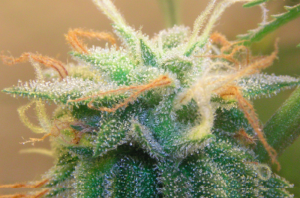Tienes El CBD? Spain, The EU, And Marijuana
The opportunities for cannabidiol-based products products are clearly there, but proceed with caution.

The bud of a Cannabis sativa flower coated with trichomes bearing cannabidiol and other cannabinoids (via Wikimedia).
My firm’s Barcelona-based attorneys have lately been receiving a steady stream of calls about producing and distributing cannabidiol-based products from Spain to the rest of Europe and beyond. Cannabidiol (CBD) is a compound found in cannabis that does not give its users a high. Studies suggest CBD can treat epilepsy and other neuropsychiatric disorders, including anxiety and schizophrenia. CBD may also be effective for post-traumatic stress disorder and may have anxiolytic, antipsychotic, antiemetic and anti-inflammatory properties. With so many potential benefits, it should come as no surprise that our cannabis lawyers get asked about the legality of CBD oil in Spain and in the European Union. Our quick answer is that it mostly depends on the part of the cannabis plant from which the CBD oil was derived.
CBD can be extracted from marijuana plants (cannabis sativa) or from industrial hemp plants. Both are cannabis varieties, but grown for a different purpose and with a different legal status in the EU. Hemp has been cultivated throughout the world for industrial and medical purposes, and for production of useful objects such as clothing, candles, paper, and thousands of other products. Hemp oil and hemp seeds also contain many essential nutrients. In Europe and in Spain, hemp must be grown under EU regulations. Industrial hemp must contain no more than 0.2% THC on a dry weight basis. If the EU criteria are met, a hemp producer may obtain EU certification for the product. Failure to follow protocol can lead to trouble. A number of Spanish farmers producing hemp are facing criminal charges for crimes against public health for having not complied with current regulations in production. This adds uncertainty for foreign investors in finding the right provider of raw material. Medical marijuana contains high levels of THC, concentrated mainly in the plant’s flowers and trichromes.

The Business Case For AI At Your Law Firm

Those wishing to import CBD-based products into Spain also face labeling requirements. The number of CBD products available on the Spanish market has increased, but most consumers are unaware of the exact amount of CBD they should take, or do not know the exact composition of the CBD oil or tincture they are buying. Clear labeling is essential when distributing CBD in Spain. A product’s label must describe the exact concentration of CBD as an active ingredient, the content of the solution, the specified amounts of each ingredient, the manufacturing method used, and the instructions for use and dosage. The label should also refer to a website with more detailed information.
Uncertainty also comes from a recent proposed change to U.S. law. Previously, the legal status of CBD products in the U.S. also turned on the part of the cannabis plant from which the product was extracted. However, the Drug Enforcement Administration recently promulgated a rule creating a new “Controlled Substances Code Number” for “Marihuana Extracts,” which extends that classification to extracts “containing one or more cannabinoids from any plant of the genus Cannabis.” CBD is a cannabinoid and hemp is a plant of the genus Cannabis, so the rule explicitly applies to CBD products sold in the U.S. This means distributing CBD products in the U.S. is illegal unless done in a state where marijuana is legal in some form.
The Spanish and EU markets have large appetites for CBD dietary supplements not currently being met by the many other plant-based dietary products easily accessible to consumers. The opportunities for CBD products are clearly there in both the EU and in Spain, but this is a complicated legal arena that calls for caution.
Sponsored

Navigating Financial Success by Avoiding Common Pitfalls and Maximizing Firm Performance

Legal AI: 3 Steps Law Firms Should Take Now

The Business Case For AI At Your Law Firm


Early Adopters Of Legal AI Gaining Competitive Edge In Marketplace
 Hilary Bricken is an attorney at Harris Bricken, PLLC in Seattle and she chairs the firm’s Canna Law Group. Her practice consists of representing marijuana businesses of all sizes in multiple states on matters relating to licensing, corporate formation and contracts, commercial litigation, and intellectual property. Named one of the 100 most influential people in the cannabis industry in 2014, Hilary is also lead editor of the Canna Law Blog. You can reach her by email at hilary@harrisbricken.com.
Hilary Bricken is an attorney at Harris Bricken, PLLC in Seattle and she chairs the firm’s Canna Law Group. Her practice consists of representing marijuana businesses of all sizes in multiple states on matters relating to licensing, corporate formation and contracts, commercial litigation, and intellectual property. Named one of the 100 most influential people in the cannabis industry in 2014, Hilary is also lead editor of the Canna Law Blog. You can reach her by email at hilary@harrisbricken.com.
Sponsored

Early Adopters Of Legal AI Gaining Competitive Edge In Marketplace








